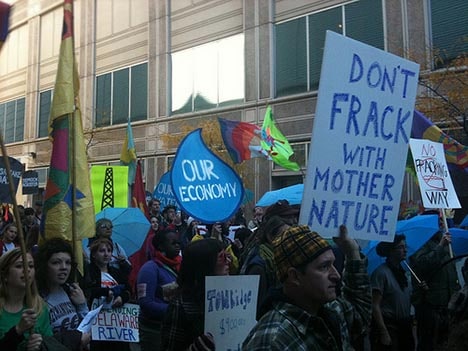Maryland’s House of Representatives voted 98-40 for HB 852, a de-facto moratorium on hydraulic fracturing and Marcellus Shale drilling in the western part of the state. The bill passed the House after five amendments attempting to block it were handily rejected.
Known as the Maryland Shale Safe Drilling Act of 2011, the legislation seeks to restrict shale gas development and the dangerous drilling method of hydraulic fracturing (a.k.a. fracking) until 2013 and the completion of a major two-year drinking water and environmental impact assessment.
Jessie Thomas-Blate of American Rivers, an environmental conservation group, notes that the risky fracking process creates a very briny wastewater that could potentially contaminate nearby drinking water supplies permanently.
As Thomas-Blate points out, “If you contaminate people’s water, you can’t go back.”
Marcellus Shale drilling has already begun in New York, Pennsylvania, Ohio and West Virginia – but not in Maryland. And since 2008, gas drilling interests have eagerly filed permits with the Department of the Environment seeking to exploit the shale deposits in the state’s Allegany and Garrett counties.
Chairwoman of the Maryland House Environmental Matters Committee, Maggie McIntosh (D-Baltimore), rightly describes the urgent need for this fracking moratorium:
“Drilling in the Marcellus Shale is not like drilling for natural gas in any other form that we have known…We’ve got a lot of questions to answer.”
Earlier in March, the Town Council for the western Maryland town of Mountain Lake Park voted unanimously to ban the drilling of new gas wells within the small town of 2,100 residents.
Working with The Community Environmental Legal Defense Fund (CELDF), the town created a Community Bill of Rights for Mountain Lake Park that “removes legal powers from gas extraction corporations within the town.”
Mayor Leo Martin describes his town’s decision:
“The people have rights. Corporations can’t be licensed to take them away. Our town government is responsible for the health, safety, and rights our citizens. When the county, state, and federal governments fail in their duties it is our duty to take action.”
The risks that come with dirty gas drilling and fracking in particular are of deep concern to Maryland residents. In 2008, speculators promised the moon to Garrett County landowner Dennis Buckel and his neighbours to allow gas drilling on their land. While waiting for the state to decide on the permitting, Buckel and others heard about what happened to Craig and Julie Sautner in Dimock, Pennsylvania, who had accepted the gas companies’ tempting offers.
Recently the Sautners’ claimed in a federal lawsuit that “they developed skin rashes and nearly passed out while showering because of fumes in the water.” With some 100 wells dug in their community and surrounding area, residents were suddenly able to light their tap water on fire.
Julie Sautner describes the plight of her family and that of her neighbours brought on by gas drilling:
“Farmers who think that this is an easy way out, it’s absolutely not. You’re trading your health and your water. We can’t move. Nobody wants to buy our house.”
Now Buckel and other Maryland residents are understandably concerned about their own properties and health if they were to allow gas drilling:
“We need to know what’s in that fracking fluid…Sure we’d like to have the lease, but we don’t want to mess up the water.”
A great deal of momentum is building against shale gas drilling and hydraulic fracturing since last year’s release of the film Gasland which depicted many families facing a similar situation to the Buckel’s.
Additionally a recent New York Times investigative series Drilling Down has also drawn more attention to the dangers of current gas drilling practices in the Marcellus Shale region. Importantly, the Environmental Protection Agency (EPA) is also in the midst of its own extensive study of fracking, with the early results expected in 2012 (and final results in 2014).
Today, the Maryland Shale Safe Drilling Act of 2011 had its first reading in the Senate Committee on Education, Health and Environmental Affairs. While there is support in the Senate for the moratorium, the oil and gas lobby is working overtime, and according to the bill’s lead sponsor Heather Mizeur (D-Montgomery), they “have been working the issue harder in that chamber.”
With the recent proposed fracking ban in New Jersey, and the fracking moratorium in place in the province of Québec (where a multi-year study is also taking place), Maryland lawmakers made an excellent first step to protect their water, environment and health from gas drilling. But the battle is just beginning. The gas industry will put every ounce of pressure it can on the Senate not to pass the bill.
Yet again, polluter lobbyists are threatening to overturn a much-needed safeguard to hold the reckless gas industry in check. Hopefully the Maryland Senate will see through their smog and vote to protect the state’s water and health.
Subscribe to our newsletter
Stay up to date with DeSmog news and alerts







